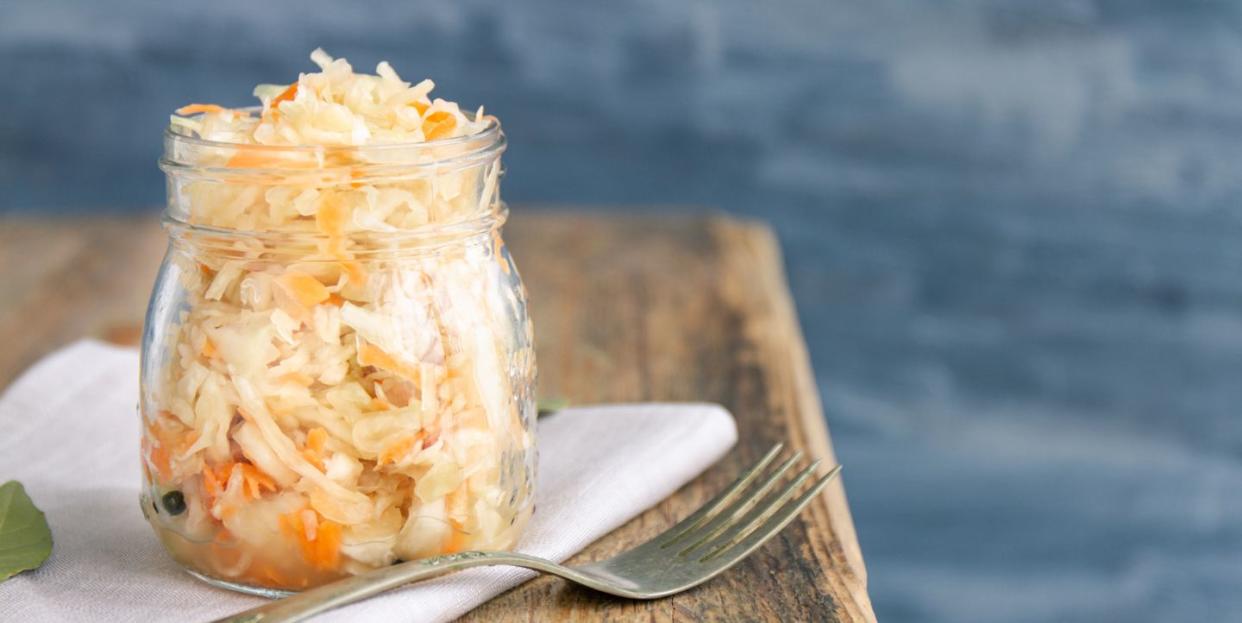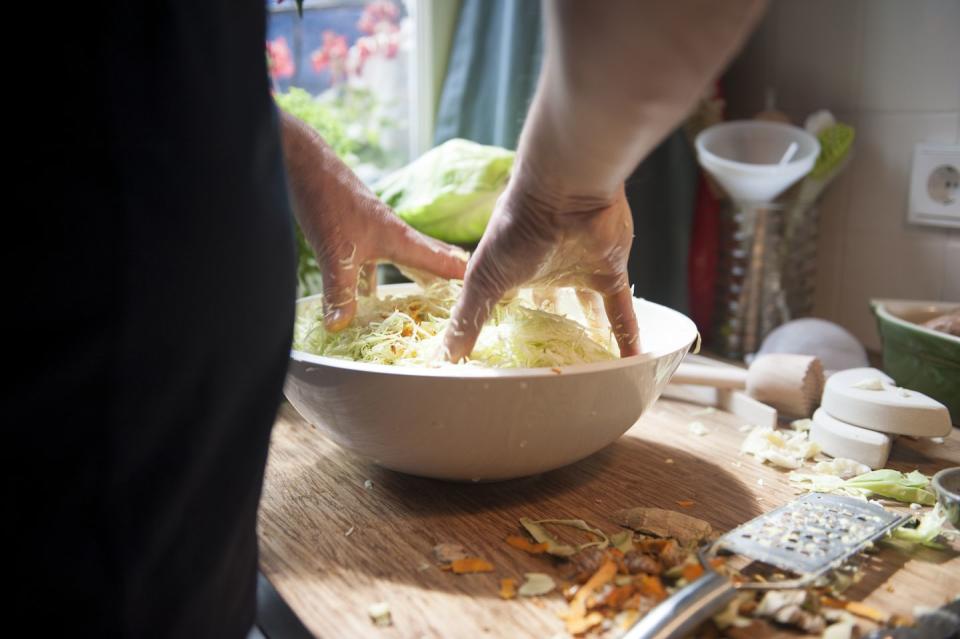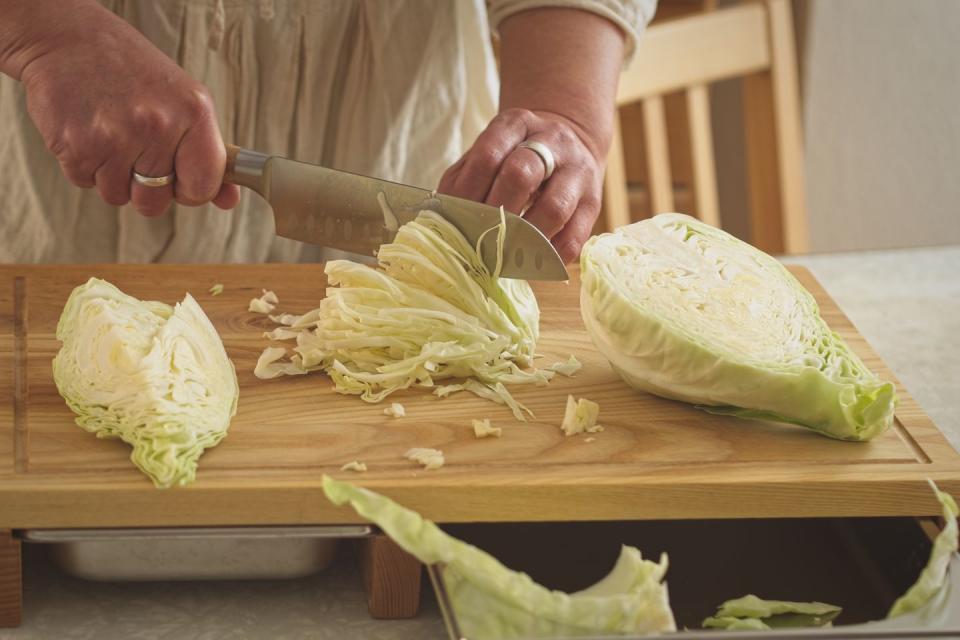Everything you need to know about gut-loving sauerkraut and its health benefits

Probiotic and prebiotic supplements promise to be the key to better gut health – and while we love some of the science-backed drinks, tablets and capsules, we think it’s important to consider how food itself impacts our digestion and microbiome. Right now, sauerkraut seems the best (and most on-trend) way to do that.
Searches for fermented vegetables are currently trending on Google, while on TikTok, viral recipes and nutrition videos are honing in on sauerkraut. And for a great reason: sauerkraut is deliciously good for us. If you’re yet to dive into the world of fermented foods (we promise it’s nicer than it sounds), here’s everything you need to know.
What is Sauerkraut?
‘Sauerkraut is fermented raw cabbage,’ says Maz Packham, nutritionist at Nourishful Nutrition. Despite fermentation being popular right now, sauerkraut is thought to date back to Roman times, when food was preserved for longevity. Now we know that fermenting food doesn’t just extend the shelf life but boasts many health benefits: it’s shown to contain various forms of bacteria that are associated with good health.
‘The fermentation process happens when beneficial bacteria naturally present on the cabbage begin to ferment the sugars in the cabbage, producing lactic acid as a by-product, which gives it that sour tangy flavour. As the fermentation process continues, the acidity increases and the beneficial bacteria thrive, which increases the probiotic content,’ explains Packham. ‘Sauerkraut also has a strong nutrient profile so it’s definitely worth including in your diet if you’re looking to support your health.’

How do you make sauerkraut?
Sauerkraut tends to be made with shredded white or red cabbage with salt added at 2.3%−3.0% of the weight of the vegetable. Packham has shared the step-by-step below:
Finely chop or shred washed cabbage and add the salt (two teaspoons of salt per pound of cabbage is a good rule of thumb). This creates the right environment for fermentation to occur.
Massage the cabbage for a few minutes to release some water from the leaves.
Transfer the cabbage and liquid into a glass jar, making sure to press down very well and tightly pack the cabbage to remove air pockets. The cabbage should be submerged in its own liquid.
Cover and leave at room temperature for one to four weeks. Once opened, store in the fridge.
There are plenty of ready-made sauerkrauts available in the supermarket for those who can’t make their own. ‘If you are picking up your sauerkraut in the supermarket, always buy it from the fridge section as anything in a jar or canned has most likely been pasteurised to make it shelf stable, in turn killing off the beneficial bacteria. Also look for products that are raw, unpasteurised and contain live probiotic cultures,’ says Packham.
Is sauerkraut good for you?
In short: yes. To explain more, Packham says: ‘The probiotic content of the sauerkraut helps to support our digestive health – the beneficial bacteria include species such as Lactobacillus brevis which can support digestion and absorption of nutrients. Consuming sauerkraut can help replenish and restore a healthy balance of beneficial bacteria which support effective digestion, immune function and overall health and wellbeing,’ says Packham.
A 2021 study from Cell found that people who ate six servings of fermented food a day for six weeks led to an increase in microbiome diversity and decreases in markers of inflammation. Another study also reported that eating 75g of sauerkraut specifically led to a significant reduction in IBS symptoms.
Good gut health isn’t just about digestion but is also linked with improved mood, which is why ‘people who eat probiotic-rich foods such as sauerkraut can improve their anxiety levels, perception of stress and overall mental wellbeing,’ says Rohini Bajekal, Nutritionist and co-author of Living PCOS Free.
And because it’s made from vegetables, it’s also a great source of nutrients too: ‘It’s rich in vitamins and minerals including Vitamin C, Vitamin K and folate,’ says Packham. Bajekal adds: ‘Fermentation is one of the rare examples of food processing that transforms food to make it even more healthy, increasing the quantity of certain nutrients such as B vitamins. Sauerkraut is also cheap to make with the average cabbage costing less than a pound in stores. Cabbage is low in calories but high in fibre and vitamin C.’
One interesting study also showed the potential cancer-beating effects of cabbage. The participants were Polish women – who typically consume three times more cabbage than Americans – who had moved to the US, a change that may have led to a dramatic change in their diet. The research found that those who continued to eat three or more servings of raw or short-cooked cabbage and sauerkraut had a 72% reduced risk of breast cancer compared with those who consumed 1.5 or fewer servings per week which researchers put down to ‘glucosinolates [compounds in raw cruciferous vegetables] that break down in the body into products with anticarcinogenic properties.’

How do you eat sauerkraut?
Sauerkraut can be eaten however you like – straight with a spoon or made into a meal. ‘If you are not used to fermented foods, start slowly as excessive consumption can lead to some digestive discomfort and bloating,’ advises Packham.
Bajekal says we should aim to eat fermented foods regularly: ‘Research from Stanford University shows that by consuming more fermented food daily – even several times a day – we can increase the diversity of our gut microbiome.’ As with any food, we want variety in the diet so trying different types of fermented foods – such as kombucha, idli, fermented pickles and kimchi is a good idea too.
‘As some fermented foods such as sauerkraut or kimchi can be higher in sodium, it is worth checking with your doctor if you have conditions such as high blood pressure before consuming significant quantities. Rather interestingly, eating fermented foods can actually reduce your chance of high blood pressure. And it is generally advised that anyone who is pregnant or immuno-compromised avoids raw fermented foods.’
While it may be made from cabbage, this isn’t the sort of food you should fry or boil. ‘I would suggest eating it raw and avoid heating it otherwise you’ll risk destroying the probiotic bacteria. If you are monitoring your salt intake (if you have cardiovascular disease or hypertension, for example) you should consume sauerkraut in moderation or you could also choose a low-salt option,’ Packham adds.
What to eat with sauerkraut?
Sauerkraut can be eaten with pretty much anything, but it’s great to have alongside your main meals. ‘It’s great on a salad or added to a sandwich for extra crunch and a zingy kick, you can also use it to top a baked potato or alongside avocado on toast,’ suggests Packham.
Like this article? SIGN UP TO OUR NEWSLETTER to receive your weekly dose of features.
You Might Also Like


